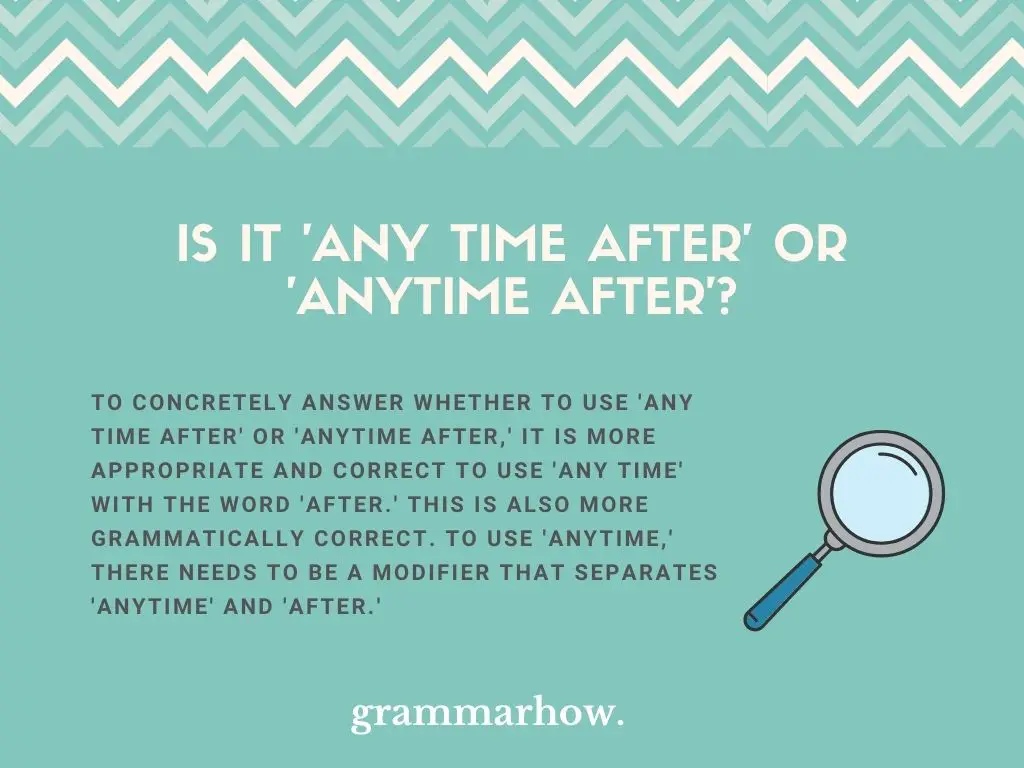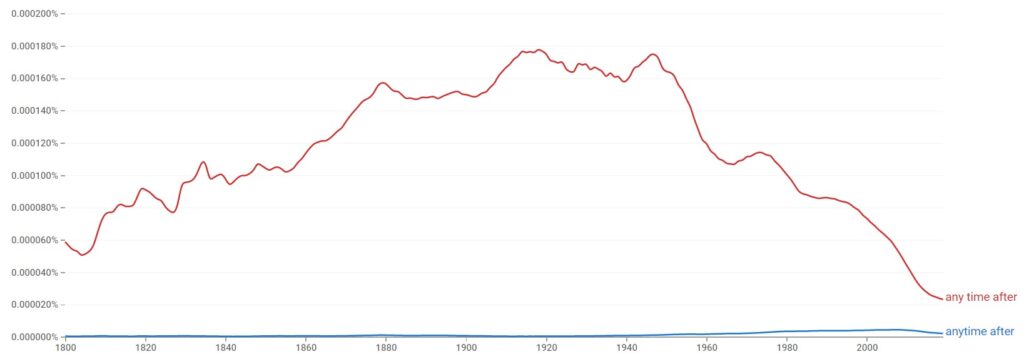If you’re in doubt about whether to use a form of a word with a space between two words or to use it as one word, then you’ve come to the right place. More specifically, ‘any time’ versus ‘anytime,’ which between the two is correct? Let’s find out and see.
Is It ‘Any Time After’ Or ‘Anytime After?’
To concretely answer whether to use ‘any time after’ or ‘anytime after,’ it is more appropriate and correct to use ‘any time’ with the word ‘after.’ This is also more grammatically correct. To use ‘anytime,’ there needs to be a modifier that separates ‘anytime’ and ‘after.’

We use ‘any time’ as a noun phrase or as an adverbial phrase. If we use ‘any time’ as an adverb, we usually precede it with ‘at.’ ‘Anytime,’ on the other hand, will always be an adverb that means ‘whenever’ or ‘no doubt.’ We only use ‘anytime’ in casual conversations, and we don’t use it in formal writing. It is also essential to note that ‘anytime’ is just a recent addition to the English language and was simply a result of a contraction called casualism.
Despite so, both ‘anytime after’ and ‘any time after’ are grammatically correct and acceptable. However, between the two, ‘any time after’ is still more flexible and appropriate to use in all cases. On the other hand, ‘anytime’ has limitations in terms of usage.
What Does ‘Any Time After’ Mean?
‘Any time’ is a phrase that means ‘any amount of time’ or something is ‘at/in no particular time.’ It usually indicates that something is happening soon but at no exact time. In some cases, ‘any’ also acts as a modifier to ‘time’ to measure a specific amount of time.
Other than this, ‘any time’ also acts as an adverb when preceded with ‘at.’ As an adverb, we also use it to describe that something will happen any time soon, but at no exact or specific hour. ‘Any time’ is always correct, and it is appropriate even in formal and academic writing.
Examples Of How To Use ‘Any Time After’ In A Sentence
Below are examples of how to use ‘any time after’ in a sentence.
- You can call me once I’m done with my shift at work. That’s any time after 6 pm.
- We can leave any time after all the participants have arrived in the boarding area and once everyone has settled for departure.
- The event is said to wrap up any time after 8 pm. It’s only 7 pm, yet the hosts are wrapping up their talk already.
- We can hold the meeting any time after three pm. Before that, we need to finish a business pitch with a client, which starts at around two pm.
- The afterparty will start anytime after nine pm. Feel free to join us if you have the time and energy to. But, don’t worry, it’s not mandatory.
- You can visit the store anytime after six am. That’s the time when we open. Then, we close at around eight pm.
- I’m free any time after ten am. So, I can meet any time after ten, whenever you are free.
Examples Of How To Correctly Use ‘Anytime’ In A Sentence
It’s essential to remember that we can only use ‘anytime’ as an adverb to define an amount of time for a specific verb.
So, below are examples of how we properly use ‘anytime’ in a sentence.
- We can depart anytime whenever everyone is ready to go. We have much time left, anyway.
- I can play with you anytime. I’m not busy since we have our spring break right now.
- You can call me anytime, as long as it’s after one pm because it’s what time I wake up.
- I can cook for you anytime, as long as it’s not on a Monday because I have night shifts on that day.
- We can leave anytime you want. Since you’re the least flexible, we’ll adjust to your schedule instead of you adjusting to us.
- I play the piano anytime and all the time. I wasn’t that skilled in piano before. But through practice, I got better and enjoyed it more.
- You can text them anytime. The communication channels are open 24/7, so it doesn’t matter what time you text them.
How Prevalent Is The Use Of ‘Anytime After?’
According to the Google Ngram Viewer, the use of ‘anytime after’ is not prevalent at all. It is probably because most English writers and speakers recognize that ‘anytime after’ is incorrect, and using ‘any time after’ is more appropriate in all situations. Thus, they use ‘any time after’ more.

You may also like: Anytime vs any time soon: Here’s the correct version with examples

Martin holds a Master’s degree in Finance and International Business. He has six years of experience in professional communication with clients, executives, and colleagues. Furthermore, he has teaching experience from Aarhus University. Martin has been featured as an expert in communication and teaching on Forbes and Shopify. Read more about Martin here.
